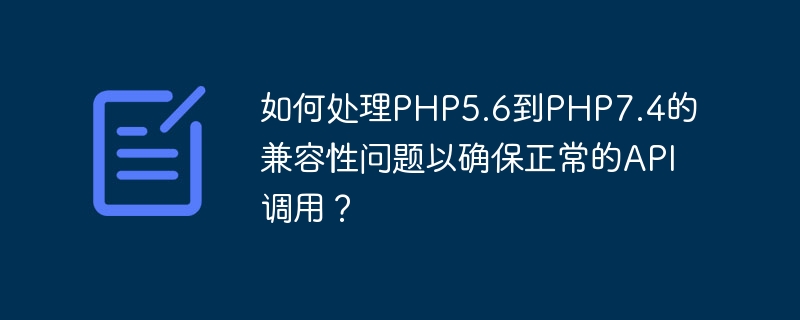

How to deal with the compatibility issue from PHP5.6 to PHP7.4 to ensure normal API calls?
As time goes by, the PHP language continues to develop and evolve, and the differences between versions gradually increase. The upgrade from PHP5.6 to PHP7.4 also caused developers to face a series of compatibility issues. In this article, we'll discuss some best practices for handling these compatibility issues and provide some code examples.
PHP7.0 introduces a new error handling mechanism, including Throwable interface, Error class and Error exception. In PHP5.6, we may use traditional error handling methods, such as using error codes and error handling functions. However, in PHP7.0 and above, we can use try-catch blocks to catch and handle errors.
try {
// 可能会产生错误的代码
} catch (Throwable $e) {
// 处理错误的代码
}In PHP5.6, we can directly assign variables in conditional statements. However, in PHP7.0 and above, this may cause syntax errors. To solve this problem, we can assign an initial value to the variable before the conditional statement.
$var = null; // 在PHP7.0及更高版本中需要预先赋值,以避免语法错误
if ($var = getValue()) {
// 执行代码
}From PHP5.6 to PHP7.0, some functions and methods have been abandoned or changed. To ensure that the code is functioning properly, we need to check where these functions and methods are called, find alternative versions and modify the code.
For example, the substr_replace function was renamed to mb_substr_replace in PHP7.0:
// PHP5.6 $result = substr_replace($string, $replacement, $start); // PHP7.0及更高版本 $result = mb_substr_replace($string, $replacement, $start);
In PHP5 In .6, the use of namespaces and autoloaders is not necessary, but in PHP7.0 and above, they are important development tools. By using namespaces we can avoid conflicts between classes and functions and use an autoloader to automatically load the required class files.
// 使用命名空间
namespace MyNamespace;
class MyClass {
// 类的代码
}PHP7.0 introduced the function of parameter type declaration, allowing us to specify the type of parameters in functions and methods. This increases code readability and security. However, in PHP5.6, this feature is not available. Therefore, we need to check the parameter types in the code to ensure that functions and methods work properly in PHP7.0 and above.
// PHP7.0及更高版本
function myFunction(string $param) {
// 执行代码
}
// PHP5.6
function myFunction($param) {
if (!is_string($param)) {
throw new InvalidArgumentException("参数必须是一个字符串。");
}
// 执行代码
}Summary:
The upgrade of the PHP language has brought some compatibility issues to developers. In order to ensure that the code runs properly, we need to deal with these issues. Some of the best practices mentioned above can help us adapt to the compatibility changes from PHP5.6 to PHP7.4. Of course, for specific applications, code modifications and adjustments need to be made based on actual conditions. By following these best practices and adapting the code to your specific needs, we can ensure that API calls work correctly on different versions of PHP.
The above is the detailed content of How to deal with the compatibility issue from PHP5.6 to PHP7.4 to ensure normal API calls?. For more information, please follow other related articles on the PHP Chinese website!




